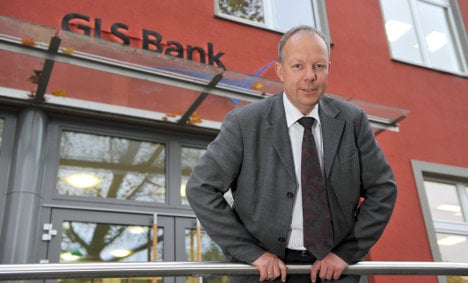Financial institutions such as GLS Bank, UmweltBank and EthikBank are luring customers with a social and ecologically-sound approach, insuring that their money won’t be used to fund nuclear energy, genetic engineering, child labour or arms companies.
The best known example of this new breed of banks is actually not so new.
The Gemeinschaftsbank für Leihen und Schenken, or GLS Bank, was founded in 1974, making it the first socially and environmentally conscious bank in the country.
GLS prides itself on giving credit to initiatives such as organic farms or renewable energy companies, lending a helping hand to independent schools or even birthing houses, hospices and institutions for the disabled.
Each line of credit from GLS is public to ensure transparency.
This method of investment brings more than a steady rate of return. Last year GLS Bank, founded in Bochum, North Rhine-Westphalia, recorded the largest growth in profits since their creation, with 37 percent growth putting a total of €1.85 billion on the balance sheet.
As the number of GLS Bank customers blossomed 25 percent to 91,000, deposits rose 39 percent to €1.6 billion.
This year the bank expects another 35 percent in growth. CEO Thomas Jorberg underlined last week that the aim of GLS Bank is not simply profit, but also sustainability through a more holistic understanding of people’s overall needs, something which is attracting ever more customers.
The UmweltBank, founded in 1997, is also profiting from the boom in ethical banking products. The Nuremburg-based institution boasts that it funds environmental projects exclusively, from building renewable energy sources to funding ecological farming initiatives.
This too has brought success, as recent reports suggest that their business share has grown 17.4 percent to €1.94 billion with customer deposits climbing to 18.2 percent to reach €1.2 billion. Credit volume has also reportedly ballooned to 16.7 percent to reach €1.4 billion.
Interest in ethical banking is also beginning to flow in from overseas, with the Dutch Triodos bank opening a branch in Germany in December 2009. Founded in 1980, it prides itself on being “Europe’s leading sustainable banking institution,” garnering returns from their funding of fair trade and microfinance projects in the developing world.
Although the growth in the ethical banking sector wasn’t enough to shield the alternative Noa Bank from insolvency in summer 2010, the growth of banks such as UmweltBank and GLS Bank indicate that the future of banking could be green.
The Local/rm



 Please whitelist us to continue reading.
Please whitelist us to continue reading.
Member comments